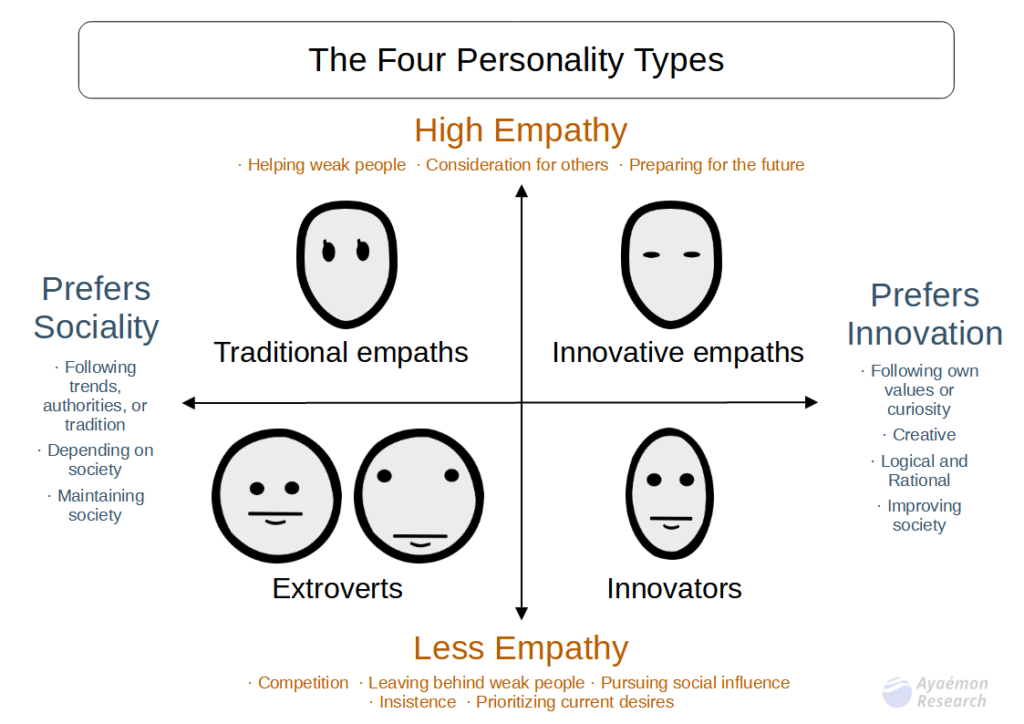Recently, I have talked about the difference in our personalities. Today, I will talk about the purpose of meditation.
What is meditation for?
Sometimes, we want to know the purpose of our nature. We might have many mysterious natures, such as high empathy, being too sensitive, worrying too much about the future, or an inability to cooperate with people.
One of the most mysterious habits is meditation. Meditation is a way to have a comfortable mind. It is like silent excitement that lasts a long time without exhaustion. We concentrate on something in our minds, such as our physical state, breathing, creation, logical thinking, emptiness, or calm imagination. That allows us to forget our worries and decide something important.

There are several styles of meditation: physical, empathic, and logical. We can clear our minds while we are moving our bodies comfortably. That is physical meditation. When we look at the beautiful natural scenery, we can let go of our trivial worries in everyday life. That is empathic meditation. We feel silent excitement while creating something. That is logical meditation.
We might often have such a mental state if we are empathic, innovative people. We can meditate through many activities, such as walking, looking up at the sky calmly, eating, cleaning, creating something, thinking about our creation, or focusing on something. We like meditation and can do it naturally. Perhaps you know that comfort.
How to use meditation efficiently in our lives
However, we don’t know the main purpose of meditation. Although it gives us a comfortable mental state, it doesn’t seem to be the main purpose because it is unnecessary. Many people can live without meditating, while we naturally meditate.

In other words, there should be a fundamental purpose for meditation.
Today, I will talk about the purpose of meditation. Meditation gives us the best mental condition to make self-judgments. This knowledge will allow us to use it more efficiently.
The four types of personalities
To explain the logic, I will introduce the four types of personalities that we often see in this blog, as shown in the following image:

An explanation of each personality
We classify our personalities into four types, as follows:
- Extroverts: They need meditation the least. They don’t have to make their own decisions because they don’t have individuality. They can follow social judgments, such as orders from authority, trends, or traditions. They usually consult with their surroundings to make decisions. They are the social majority.
- Traditional empaths: They tend to meditate to get individuality or wisdom to fix their problems. That is why they prefer to connect with the gods or deep consciousness. They tend to want to meditate during a confused era.
- Innovative empaths: They need meditation the most. They have to make their own decisions to live naturally. They have individuality and want to live a stable life without relying on social support. That makes them always need meditation to decide for themselves. They are the social minority.
- Innovators: They meditate to gain mental patience, limit their desires, and prepare for the future. They tend to want to meditate during a confused era.

In this article, assume we are innovative empaths. Then, let’s look at the purpose of meditation below.
Meditation: A way of self-judgment
Meditation is a way to create a mental condition to make self-judgments. That allows us to make decisions based on our values, regardless of others’.
In other words, the more people who want to live independently away from society, the more they need a meditational mental state.

Perhaps that is why we, innovative empaths, can naturally meditate on any activities we can do from the heart. Meditation gives us a way to be mentally independent.
Remembering our values
That is why we can easily remember our values and make big decisions when we meditate.
For example, imagine we are depressed by a failure in our social life and look up at the sunset sky. At such a time, we often remember our values.
“Come to think of it, I don’t suit that kind of social activity. I loved music. It may be time to try it.”

In other words, meditation brings us honest feelings while excluding an inferiority complex. Meditation and an inferiority complex are incompatible.
Innovative empaths: the least to panic
Perhaps that is why innovative empaths can keep cool even in a crisis. We are the least likely to panic because a lack of self-judgment causes panic.
Perhaps the more chaotic our surroundings are, the more meditative we can be.
For example, imagine or remember when we are in junior high or high school. We are taking classes in a school classroom. It is thundering and raining heavily outside.

At such a time, a loud thunderbolt strikes nearby and causes a power outage. The girls scream, and the whole class is upset.
Perhaps innovative empaths are the ones who can keep cool the most in such a situation. Although we are surprised by the loud sound of the thunderbolt, we don’t scream and quickly regain our ability to think.
The meditative mental state of innovative empaths
Another example is my experience when I was in high school. At that time, I wondered why some girls in my class would scream in surprise at the sight of the bug.
Perhaps that is the difference in attitudes toward a crisis or unexpected events. Innovative empaths tend to be less upset and regain self-judgment soon. On the other hand, extroverts tend to be reactive and lose themselves.

When we encounter an unexpected situation, we soon calm down and concentrate on thinking about what happened and why it occurred. That is the meditative mental state.
Meditation to live our lives
That means that our self-judgment improves our meditational ability. In addition, the more we meditate, the more we can live our lives.
In other words, if we cannot meditate, avoiding the decision would be better because it would be in the wrong direction. An inferiority complex often causes it.

If we meditate, we will find the most rational and empathic way to live.
Don’t mistake means for ends. Meditation is a way to live independently. Meditation is not a goal. We use it as a way to make decisions.
Conclusion
Meditation gives us the best condition to make self-judgments.
That allows us to live independently away from society. The more we meditate, the more we can live our lives.
This knowledge might allow us to use meditation more efficiently.
Thank you for reading this article. I hope to see you in the next one.


